ISPs
Latest
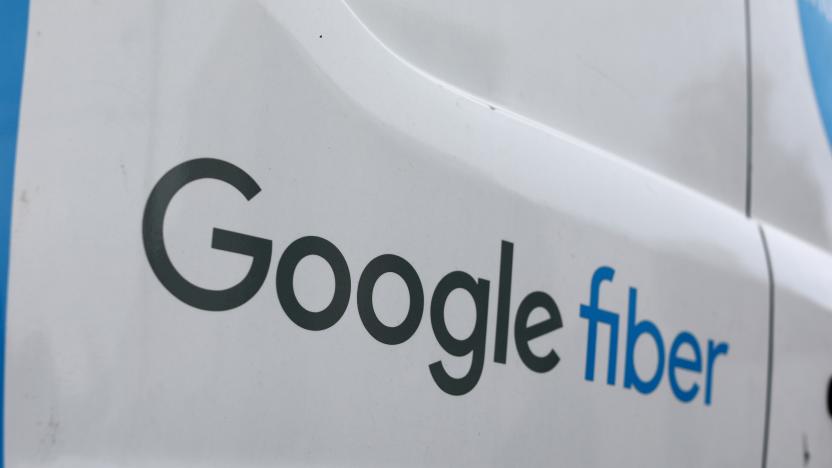
Google Fiber launches 5Gbps service for $125 per month
Google Fiber is introducing a $125-per-month service with symmetrical uploads and downloads today. However, it only covers four cities at launch.
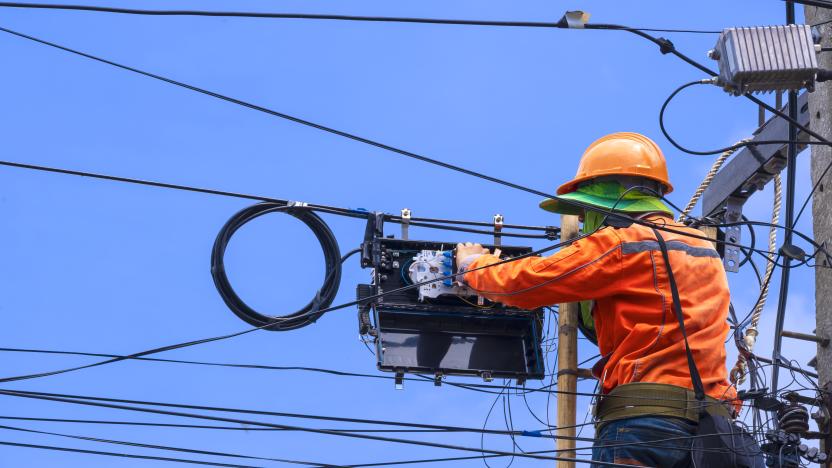
White House agreement sees ISPs cap broadband prices for low-income households
Twenty internet providers including AT&T, Comcast and Verizon have agreed to offer high-speed broadband internet plans for no more than $30 per month.

Verizon will provide free internet to students in Los Angeles
Verizon will provide free internet access to all students who need it in the Los Angeles Unified School District (LAUSD), the company announced today. This could help as many as 100,000 students continue to learn while schools are closed.

The FCC chairman thinks it's still 1996
FCC chairman Ajit Pai sounds like a broken record. "Light-touch framework." "Light-touch approach." "Light-touch regulation." As an ideological concept, it seems reasonable. Especially to a conservative such as Pai, who believes that the government shouldn't "pick winners and losers," to use a favorite phrase of Republicans. Except, when you actually look closely at the chairman's argument about how to regulate internet service providers, it collapses under its own misguided logic.
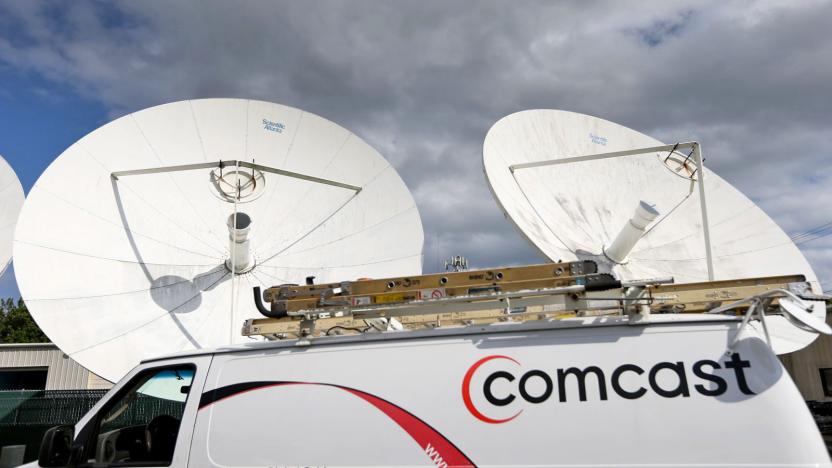
Ad groups ask FCC to reconsider ISP tracking opt-in rules
If you ask most Americans which company they'd least trust with their data, the answer would probably be "Comcast," or maybe "Time Warner Cable" -- both ranked in the bottom four of Temkin's 2016 trust ratings. That's perhaps why the FCC decided to force broadband providers to get your permission before collecting private browsing data, rather than putting the onus on you to opt out. However, advertising groups have petitioned the agency to reconsider the rule, calling it "onerous" and a violation of first amendment commercial speech protections
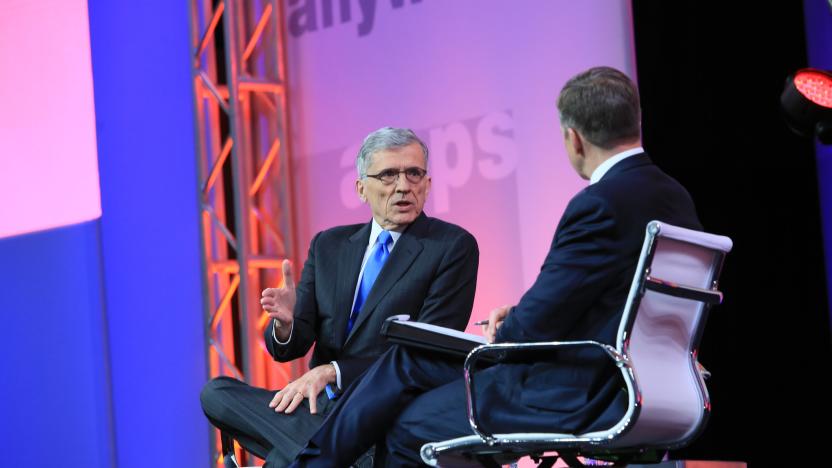
The FCC wants ISPs to get permission before sharing your data
FCC Chairman Tom Wheeler proposed new rules on Thursday that would require internet service providers like Time Warner and Comcast to disclose how they use customers' personal data, and ask permission before sharing this information with outside organizations. Wheeler outlined the broad strokes of this plan in March, when the FCC voted to accept public comment on the proposed rules. Six months later, the comments are in and the full Commission will review the new plan at its monthly meeting on October 27th.
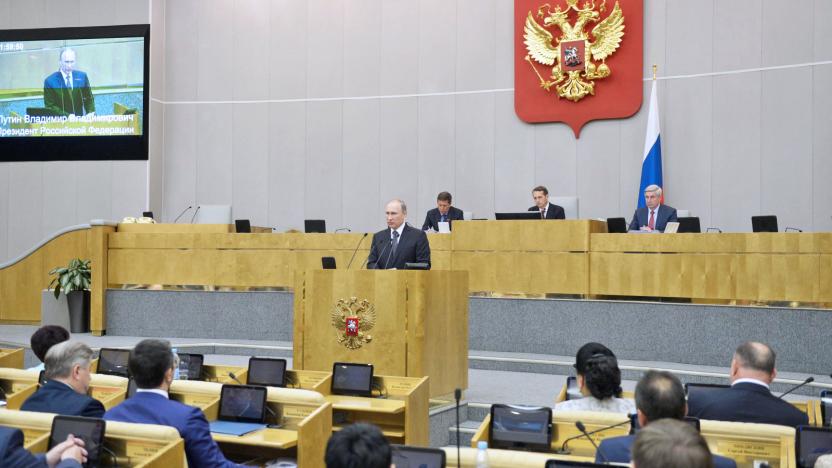
Edward Snowden is not a fan of Russia's 'Big Brother' bill
With Russia about to pass a law that will make it even more Orwellian than it already is, one of the nation's most famous residents has chimed in. Edward Snowden tweeted that "Russia's new Big Brother law is an unworkable, unjustifiable violation of rights that should never be signed." The NSA whistleblower added that "mass surveillance doesn't work. This bill will take money and liberty from every Russian without improving safety."

UK government considers fining providers with confusing T&Cs
Although companies are legally required to list terms and conditions when a customer buys something, they can often be confusing or outright misleading. ISPs and mobile operators are especially guilty of this and a lot of the time consumers ignore them completely. The UK government has decided now is the time to act, so it's launched a new consultation to make things simpler for consumers and possibly fine online companies that don't comply.

US internet providers fail FCC's annual broadband test
A year after the FCC redefined broadband, 34 million Americans still lack access to the minimum standard, according to the commission's preliminary report. Specifically, 10 percent of the nation can't get internet speeds of 25Mbps for downloads and 3Mbps for uploads. While internet service providers did improve speeds significantly over last year, a lot of that came in urban areas, where only four percent of folks lack broadband connectivity. It's a different story in rural areas, however, where 39 percent of homes can't get a decently fast connection. The situation is the worst on tribal lands, where 41 percent of residents lack broadband.

UK ISPs ordered to block e-book piracy sites
In a major victory for book publishers, the UK's High Court has ordered internet service providers (ISPs) to block several sites offering pirated e-books. The decision means that BT, Sky, Virgin Media, TalkTalk and EE now have 10 days to comply and ensure their customers can't access the following link depositories: AvaxHome, Ebookee, Freebookspot, Freshwap, Libgen, Bookfi and Bookre. The Publishers Association (PA), which sought the blocks under the UK's Copyright Design and Patents Act 1988, claims the sites collectively hold around 10 million e-books, and that at least 80 percent of them are infringing copyright. It's been described as the "first action of its kind brought by UK book publishers," following similar ISP blocks levied against sites hosting music, movies and TV shows.

UK ISPs will enlist the help of customers to flag extremist content
In its mission to keep us safe from extreme content, the British government has persuaded the UK's largest ISPs to add a "public reporting button" for their customers. BT, Virgin, Sky and TalkTalk have all agreed to the idea in principle, but they're yet to share how it'll actually be implemented. The new button should, in theory, lift some of the burden away from the authorities and encourage more people to flag radicalising material. Every week, the UK's Counter Terrorism Internet Referral Unit pulls 1,000 items from the web that breach the 2006 Terrorism Act; enlisting the public will increase the number of eyeballs they have scouring the web and should shorten the time it takes to remove infringing content.

Comcast and TWC voted most-hated ISPs in America's most-hated industry
America's Consumer Satisfaction Index doesn't have a lot of nice things to say about Comcast or Time Warner Cable. The two business, which are currently trying to merge with each other, were found to be the worst ISPs in the most-hated industry that the index covers. Time Warner has the dubious achievement of making an all-time low score of 56 out of 100, with Comcast coming in just ahead of it with 57. On the other end of the scale, the 12,248 participants reluctantly gave their blessing to Verizon's FiOS, with a score of 71, and AT&T's U-Verse, which scored 65. What will this mean if Comcast and TWC do create a nationwide "triple play" behemoth? Mammoth profits for some, and red-faced calls for plenty of others.

AT&T thinks increased bandwidth costs are Netflix subscribers' problem
AT&T's swinging back at Netflix CEO Reed Hastings' recent assertion that ISPs (internet service providers) should shoulder the cost of increased bandwidth demands. In a post on AT&T's Public Policy Blog, Senior EVP Jim Cicconi denounced Hastings' desire for a "cost-free delivery" agreement with ISPs, saying that it unfairly shifts the burden of infrastructure cost to AT&T and its subscribers rather than to Netflix's own customer base. As Cicconi views it, that subscriber base is the very one responsible for the increased traffic demands and resulting need to build out additional facilities, and should therefore bear the brunt of a fee hike. In an attempt to highlight what he sees as Hastings' "arrogant proposition," Cicconi goes on to point out that this "self-righteous" streaming model is akin to Netflix "[demanding] a customer's neighbors" pay the cost of its DVD mail delivery service. The comparison isn't quite apple-to-apples, but his point is fairly straightforward: if you're using Netflix, it's up to you to pay for high-quality streams. In other words, it's not AT&T's problem. And also, AT&T just doesn't want to pay for Netflix's "good business fortune." But that much should already be crystal clear. [Image credit: Getty]

Researchers propose à la carte internet services, overhaul for web infrastructure
A quintet of researchers funded by the National Science Foundation have envisioned a new internet architecture, one where features could be purchased à la carte. The proposed framework would allow users to fine tune their experience by choosing from a variety of connection services. Let's say, for example, that a customer's connection is fine for browsing the web, but it doesn't pass muster for streaming content -- a service dedicated to video delivery could be added to close the gap. "Ultimately, this should make the internet more flexible and efficient, and will drive innovation among service providers to cater to user needs," report co-author Rudra Dutta told The Abstract. A piecemeal next-gen web is no easy feat, however, as it would require revamping the web's infrastructure with new protocols for choosing particular features, completing payments and monitoring network performance. The group's rough blueprint will be presented at a conference next week, but you can thumb through their short paper at the source.

Rogers Communications violates Canadian net neutrality rules over WoW bandwidth throttling
The Canadian Radio-television Telecommunications Commission recently ruled that Rogers Communications, one of the largest internet service providers in Canada, has violated federal net neutrality rules. Last year, I wrote a few Lawbringers about the subject, which discussed what Rogers had to actually do to escape violation of certain internet traffic throttling complaints. Basically, Rogers was making WoW players' internet access slower because WoW looked like peer-to-peer traffic on their network. Rogers is finally going to have to answer for the throttling issues, even after all of the requests and demands to change their packet inspection protocols. The communications company has until Feb. 3 at noon to respond to the complaints about internet throttling or face a hearing with the CRTC board. Hopefully, the same type of rules can make their way to America, where internet service is abysmally slow and throttled like crazy. Prior to the Cataclysm launch, Blizzard released the new WoW client, which used a peer-to-peer system to upload and download information, patches, data, and all that jazz. This data accidentally triggered internet service providers' bandwidth alerts for torrent traffic and was subsequently throttled to lower speeds. After realizing that many users were experiencing lag issues with the new launcher and their ISPs, Blizzard began its outreach to ISPs in order to work together to fix the problem. A year later, people are still having problems, and Rogers in Canada has admitted to throttling WoW bandwidth.

BT 'Content Connect' lets ISPs charge content providers for high-speed video delivery
We haven't heard a ton of talk about net neutrality here at CES, but the issue has now cropped up in a fairly big way across the pond -- British Telecom's wholesale division has just rolled out a service it calls "Content Connect," which basically allows ISPs relying on BT's network to charge content providers like YouTube for high-speed delivery of video within the UK. That naturally means that anyone who doesn't pay will have to deal with slower video delivery, which would in a very real sense create a two-tier internet. For its part, BT insists that it "supports the concept of net neutrality," and it says that the new service will actually speed up download speeds even for those that don't pay up, as it would ease network congestion. All which, of course, echoes some of the core arguments we've been hearing for years now, and won't likely stop hearing anytime soon. [Thanks, Pete]

CRTC sets net neutrality rules for Canada, allows throttling as 'last resort'
The FCC may be yet to act on Chairman Genachowski's proposed net neutrality rules, but the agency's Canadian counterpart, the CRTC, has made a fairly significant ruling of its own on the matter today, and it seems like it may have manged to disappoint folks on both sides of the debate in the process. The short of it is that the CRTC will allow internet service providers to practice "traffic shaping" (a.k.a. bandwidth throttling), but only as a "last resort," and only after it has issued a warning that the throttling will take place (30 days in advance for regular users, and 60 days for wholesale customers). What's more, the CRTC is also recommending that ISPs "give preference to Internet traffic management practices based on economic measures" before cutting into customers downloads -- in other words, charge more for extra bandwidth, or offer discounts during non-peak hours. Read - CRTC ruling Read - The Globe and Mail, "CRTC sets Web 'throttling' rules"

Worldwide Mac: getting online in New Zealand
Last year, after years of planning, my wife and I left the United States and moved to New Zealand. Moving to the other side of the world has meant adjusting to an entirely different geography and culture. Driving on the left, the "reversed" seasons, the completely unfamiliar constellations and upside-down face of the moon, and having everything expressed in metric are ever-present reminders of just how much life has changed for us since leaving the U.S. Another thing that's changed is our internet situation, and some of the changes have been big enough that it's profoundly affected our computing habits. In the U.S. we had a fairly decent internet connection, especially for the Cleveland market: a 5 Mbps download speed, 768 Kbps upload, all delivered over the same cable line that delivered our television service. That internet connection, plus basic cable and a DVR, cost us a little over US$100 per month. In New Zealand, the broadband landscape is completely different, and it's forced us to completely adjust our usage patterns. According to a recent Norton Online Living Report (links to NZ Herald) commissioned by Symantec, New Zealanders spend an average of only 12.7 hours online per week, compared to a global average of 23.6 hours. Analysts are unsure why New Zealand lags so much in internet usage compared to the rest of the developed world, but after nearly a year of sampling the best they have to offer down here, I'm not at all surprised.

Central US woes [updated]
According to Drysc, there's a Blizzard-external network problem in the central United States that is currently affecting several WoW realms. Symptoms include high latency, packet loss, disconnection, or inability to connect; side effects may include broken keyboards and bruised fists, or in severe cases, deciding to stop playing WoW for the evening.I'm not sure which realms are affected, but it's nice to know that this is being worked on anyway; the glowing tree promises that they are actively receiving updates from the (unnamed) parties involved. There is currently no ETA on a fix. I'll keep you posted if I hear anything else. In the mean time, let's start building a list: if your realm is acting up, let us know in the comments.Update: Drysc is saying the issue "appears to have been resolved," but they're still keeping an eye on it.











